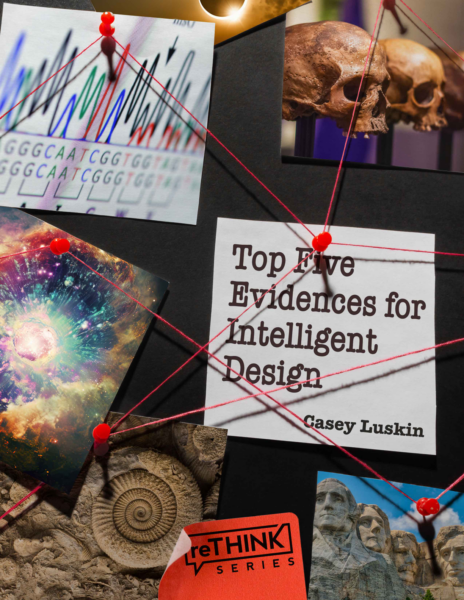ReThink Series
This series of essays allows you to easily share mobile-friendly overviews of key issues related to evolution, intelligent design, and the impact of these theories on scientific progress, religious belief, and society at large.
Please note: Rather than sharing this page, designed specifically for activists, please review each essay and then share individual links as they best fit your audience. If you’d like to directly link to any of these essays on your own webpage or social media page, please first complete our Permission for Reuse of Material request form. If you’d like to share any of these essays to an email list of more than 100 contacts, please reach out to our team using our contact form and we’ll respond with some important guidance as soon as possible.
What is Intelligent Design?

Philosopher of science Stephen C. Meyer argues that the appearance of design and purpose in nature and the cosmos — dismissed by many outspoken scientists since Darwin as an illusion — is in fact based on reality and that intelligent design can be detected using standard scientific tools.
https://www.discovery.org/f/57851/
Top Five Evidences for Intelligent Design

Geologist and attorney Casey Luskin explains how intelligent design functions as a legitimate scientific theory and then dives into the top five lines of evidence that support the theory — from the origin of our finely-tuned universe to the origin of human consciousness.
https://www.discovery.org/f/100189/
A Not-So-Brief History of Intelligent Design

Writer and editor Jonathan Witt takes us on a fascinating historical tour to reveal how the concept of intelligent design is both ancient, discussed by Greek philosophers as early as ~500 BC, and also contemporary, with the recent development of a rigorous scientific theory of origins.
https://www.discovery.org/f/87197/
Scientific Evidence for a Creator

After covering much of the same content as in “What is Intelligent Design?” above, Stephen C. Meyer then proceeds to unpack the theistic implications of intelligent design by arguing for a transcendent — rather than immanent — designing intelligence, or in other words, for God.
https://www.discovery.org/f/69279/
The Fossil Record v. Darwin

German paleo-entomologist Günter Bechly reveals the checkered history of the fossil record’s role in supporting Darwin’s theory of evolution and shows how the true “missing links” are still missing and instead, we have a strong pattern of sudden appearances in the fossil record which refute Darwinian gradualism and any other theory of unguided common descent.
https://www.discovery.org/f/68730/
Darwin’s Three Big Ideas That Impacted Humanity

Political scientist and author John G. West investigates the impact of Darwin’s theory of evolution, revealing how the theory fueled three big ideas with significant consequences for humanity — an attack on human uniqueness, a denial of design and purpose in nature, and a portrayal of mass death and destruction as the ultimate creator in the history of life.
https://www.discovery.org/f/57420/
Darwin’s Cancel Culture

Despite the existence of thoughtful skeptics of Darwin’s theory of evolution from its inception until today, John G. West illustrates how an appalling cancel culture has developed which seeks to hide the internal debate taking place among biologists, present a false consensus to the unsuspecting public, and punish anyone who dissents from Darwin or argues in favor of intelligent design.
https://www.discovery.org/f/67498/
The Rise of Totalitarian Science

Expanding on his previous investigations into the abuses of science in American public policy over the last century-and-a-half, John G. West now reports on the rise of totalitarian science and its impact on culture as it is shockingly illustrated during the recent COVID-19 pandemic.